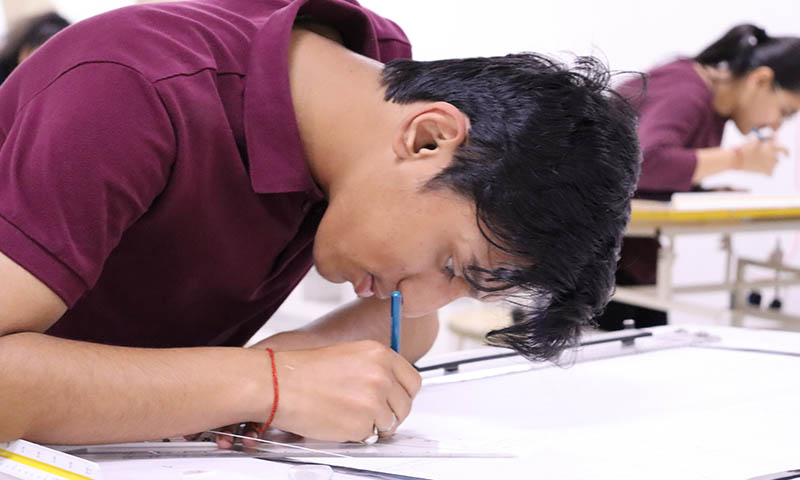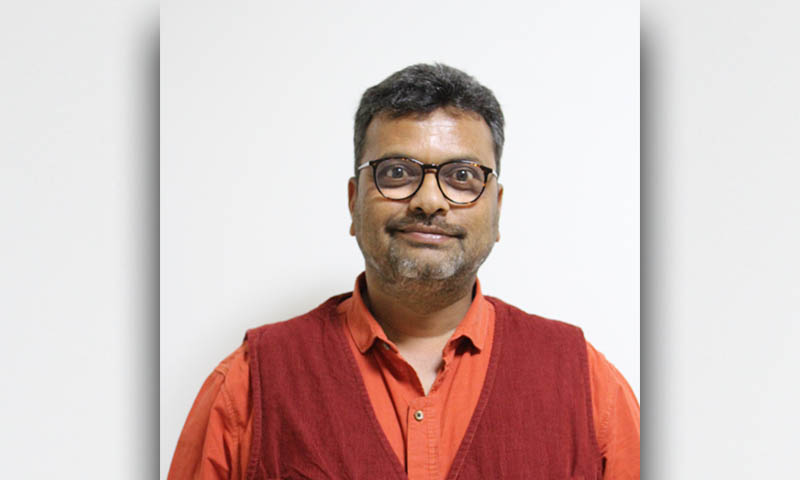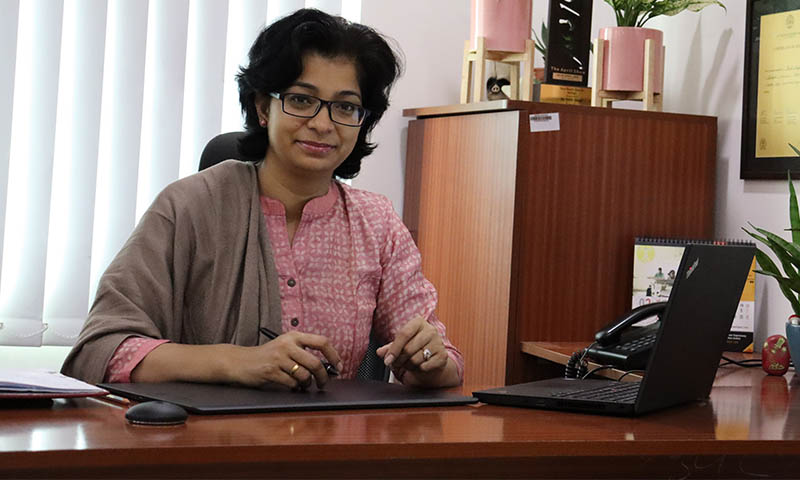Efficient use of the limited space available is the need of the hour in our society today. No doubt, companies operating in this sector are in an active lookout for interior designers with a creative bend. Manipal University Jaipur (MUJ), which has produced quite a good number of Interior design students in the past two years, has clearly seen this demand. Over 90 per cent of MUJ’s Interior Design students have been absorbed by the industry and approximately 5 per cent have dared to begin their own startups. Dr. Sampath Kumar, Director, School of Planning and Design of MUJ explains, “Interior Design being part of Construction Industry still has a growth rate of 7.3 per cent according to MHRD and has a sectoral employment requirement of approximately 15.09 million as per 12th 5-year plan, which makes us think that there is good demand of skilled people. In this line, we as educational institutes create a mechanism wherein education provided by us is in line with current market requirements.”

MUJ has adopted some of the best practices to bring development in the higher education sector, old age syllabi and courses are revamped from time to time so that they meet the demand of the society and industry to meet emerging trends. The university is also focusing on training Hands (Skill), Head (Application) and Heart (Societal Implication) with an appropriate balance among the three. “Skilled based jobs require an attitude of ‘lifelong learning’ from its seekers and with constantly changing world markets as well as its increasing requirements, it is important that students should also make a personal effort in learning current skills essential for survival in their professional domain,” opines Dr. Sampath.

MUJ’s Department of Interior Design came into existence in the academic year 2015-2016. The department believes in increasing the overall spectrum for students with more practical knowledge and options in the design world. The course aims to develop a sense of association between the user and the space that redefines the satisfaction of the end-user. “Adopting the University’s vision of Global Leadership in Higher Education and Human Development, we provide excellent ambience to enhance the teaching-learning experience and to promote creativity and innovation,” shares Ar. Sneh Singh, HoD of Department of Interior Design, MUJ. The department currently running B. Des. (Interior Design) –4-year programme with a multiple exit option of B.A. (Interior Design) – 3-year programme, providing more flexibility to students.
Innovating the Best Practices in Higher Education
With its mission of becoming the most preferred University for innovative and inter-disciplinary learning, MUJ has not only adopted the best practices from reputed Institutions but also initiated some innovative ones, in order to keep ahead of the competition and to provide excellence in higher education. The process is further facilitated by MUJ being a New Age University enabling it to leverage technology in a big way. “The Interior Design Department is conscious of the fact that the jobs in the industrial set- up are available to the students who are skilled and competent in handling real-life situations,” pinpoints Sneh. The objective of the Department of Interior Design is to promote intellectual inquiry among students, along with their creative expression and originality through a structured curriculum that balances theory with practice, planning, and experimentation; art and technology; as well as creativity and logic.

In fact, MUJ has inculcated UGC recommended Choice Based Credit System for the students to study at their own pace and earn less/more credits whenever needed. This offers each student to choose from Departmental Elective subjects and Open Elective subjects throughout university following a multidisciplinary approach. “Credit exchange Program is there which enables students to study a semester abroad in foreign universities of academic repute. The Outcome-Based Education curriculum and syllabi enhances student’s skills through professional education,” states Sneh. The institute also integrates inputs from the faculty, industry experts, students and alumni in the curriculum with innovative processes such as Curriculum conclave. “80 percent of the courses incorporated in the programme focuses on skill development and employability,” adds Sneh.

As the Designer needs to be well-versed with new materials, processes, technology and understand aesthetic, social and functional needs of users, the Interior Design Department with the help of faculties, has strengthened the delivery of all laboratory activities such as Furniture workshop, Model making Lab, CAD Lab, Material museum and Construction yard. “We enhance students’ hands-on experience and exposure given to the students with the help of continuous workshops and industry visits. A 6-month Practical Training is a mandatory academic activity as a part of the Interior Design Curriculum to enable the students to get a range of practical experience,” shares Sneh.
A Preferred Choice of the Industry
Industry collaborations at MUJ are dedicated to academic and professional synergization and research association with more than 34 Frontline Industries/Multinational Organizations. The university endeavors to provide opportunities to its students and faculty to stretch their wings towards global networking. MUJ’s Interior Design Department has taken initiatives in collaborating with organizations like Hafele and Armstrong, where we are developing our furniture lab with them and industry experts from the organization visit regularly to interact with the students. “Networking with professionals in one’s area of study, areas immediately connected with it as well as distantly related to it is becoming increasingly necessary for his/her growth. One must have an attitude of inquiry, mastery, and networking for career growth as well as for personal satisfaction,” opines Sneh.

MUJ takes care of all the aspects to provide quality education and training to produce world-class professionals. The Industry-Institute Interaction at MUJ is designed to run longer period for preparing the manpower of world-class in the field of design by inculcating the various skills required by the industry, thereby contributing to the economic and social development at large. “We believe in the freedom of thoughts and expression. Following the above, the faculty handpicks the practicing offices/firms depending on the work domain and preference of each student. The process requires the student to compile the work in their design portfolio, followed by a personal interview,” explains Sneh.
The methodology adopted by The Interior Design Department helps the students to enhance their strengths and work on their weaknesses. Students find a convenient work environment that promoted their career advancement, and most of them prefer to continue to work in the same office on the completion of their graduation. Most of them are placed under well-renowned designers, architects, furniture studios and MNC’s across India.

MUJ’s focus is not limited to generating employment opportunities for its graduates. Sneh says, “We have a large pool of talented students and faculty members and we support the development of research, thinking and communication processes to enable to envisage creative and innovative solutions to design problems.” To support the research activities of the students, the establishment of a centre of excellence and E-cell with adequate funding is provided by the University. E Cell, MUJ incubates Start-Ups to encourage the student to turn into entrepreneurs. In order to motivate students to come up with innovative ideas, proposals are invited all through the year. The final projects of the students are assessed by industry experts every semester, thereby improving the placement potential of students. In addition to that, the experts from the industry are invited regularly to tell students about the innovation and practical techniques of the field. “We have been entering into agreements with national and international academic and industrial set-ups to provide the best academic and professional knowledge to the students,” pinpoints Sneh
The university has made its presence felt amongst the highest echelons of the who’s who of the world of Technology and Engineering in such a manner that, Atal Innovation Mission, NITI Aayog, Government of India sanctioned instituting Atal Incubation Centre at the university premises. DST, Government of Rajasthan, acknowledging the University as the Centre of Excellence, has designated it as Technological and Training Centre. MUJ also has fully funded Students’ clubs and incubation centres to enable students to innovate and participate in various competitive events. As a result, Interior Design students created a new startup ‘Paryaay’- Low cost furniture for rural area. “Our students have started their own club – De artistry club, which conducts regular events and promotes green practices throughout the university,” adds Sneh

Keeping in focus the overall vision of metamorphosing into a Global Leader in Higher Education and Human Development, MUJ has recently received NAAC A+ accreditation, making it first such university in Rajasthan. “We have been ranked in top 200 universities by NIRF and committed to be placed in top 100 by 2022 by continuously refining and enriching our methods through employee and student engagement initiatives,” shares Sneh. MUJ is keen on starting new Master programs, PhD course and short-term programs. “From this year, we are focusing more on Research and publications simultaneously strengthening faculty with higher qualifications,” concludes Dr. Sampath.
Dr. Sampath Kumar, Director of School of Planning & Design

Dr. Sampath started his career with Textile Engineering colleges in the states of Karnataka and Maharashtra as a lecturer. In 1995, he moved to IIT Delhi to pursue his Doctoral work. He has worked in two more Institutes in Bangalore as Dean of Academics before joining Manipal University. He has worked in about 30 handloom and handicraft related projects and has helped to register three crafts of Orissa under IPR. He is a qualified ISO auditor and qualified Assessor in skill development sectors of textiles, apparels and handmade fabrics. He has visited Germany along with weavers in exhibiting the dhurries of Warangal in Andhra Pradesh made from natural fibers.
Ar. Sneh Singh, HoD, Department of Interior Design

Ar. Sneh Singh is an Associate Professor & Head of the department of Interior design with 12 years Academic and Industrial experience. She has done her B.Arch. from Government College of Architecture, Lucknow and Master’s from IIT Kanpur in Industrial Design. Before joining MUJ, she has worked on International Design and construction projects such as Signage & Wayfinding design of Khalifa Stadium (for FIFA world cup 2020). She is also a LEED Accredited Professional (U S Green Building Council) and has good experience of handling Indian and International LEED rated construction projects. She is associated with MUJ from 2014.




